William C. Armor – Historian and Bookseller
Posted By Norman Gasbarro on December 12, 2012
William C. Armor (1842-1911), historian and bookseller of Harrisburg, played an important role in the Civil War in one of the first regiments recruited into service, the 28th Pennsylvania Infantry, in which he served as an officer. The story of his life appeared in the Commemorative Biographical Encyclopedia of Dauphin County, published in 1896. William Crawford Armor was a descendant of Scotch-Irish immigrants who arrived in America before 1910 and settled in Lancaster County, Pennsylvania. While still in his teens, he became a school teacher in Westmoreland County, Pennsylvania, and while he wished to pursue an academic career, his father had other, more practical plans for him and steered him toward the iron industry. The sketch appearing in the Biographical Encyclopedia, page 1193, then tells of his military experience:
He was dutifully engaged [in the iron moulding trade] when the war of the rebellion broke out. Enlisting in Company B, 28th Pennsylvania Volunteers [28th Pennsylvania Infantry], he rose to the command of his company, was wounded at Antietam and Chancellorsville, appointed aide-de-camp to Maj. Gen. John W. Geary, Second or White Star Division of the Twelfth and Twentieth Corps, breveted Major for “gallant and meritorious conduct in the campaign of the Carolinas.” At the siege of Savannah he was specially assigned by General Geary to command the “flying bridge detail,” which was to bridge, with bundles of sugar cane, the dikes or canals, in front of the rebel works, for the storming party to pass over in the grand charge outlined by General Sherman. This “forlorn” hope was saved “to fight another day” by the very obliging retreat of the enemy the night before. During the progress of the war he was twice appointed to West Point but declined the offer preferring to keep his contract as he had “enlisted for the war.” After serving for four years and one month, with never a day in the hospital except when wounded, he retired to civil life, declining the urgent solicitations of prominent generals to enter the regular army.
But, his civilian, post-war career took an unusual turn after only one year, in which he worked in Pennsylvania’s oil industy. Armor’s old commander, John W. Geary, had been elected governor of Pennsylvania and called him into governmental service as a confidential clerk – to which he responded by re-locating to Harrisburg. While working for Geary, Armor researched, wrote and published Lives of the Governors of Pennsylvania with the Incidental History of the State from 1609 to 1872. [Note: This volume is available as a free download. Click on title].
Following the publication of Lives of the Governors, Armor studied law, but did not apply for admission to the bar. Instead, he spent about six year in Pittsburgh working in the glass industry. But because of failing health, he gave that up and turned again to writing, this time as editor and publisher of The Petroleum Age, a trade publication important to the national oil industry. After eight years working at this venture in McKean County, Pennsylvania, William C. Armor decided to take a position as an assistant in the State Library in Harrisburg and the experience gained allowed him to become Librarian of the Harrisburg Public Library. In the latter part of the nineteenth century, he was one of the most important and well-known literary figures in Harrisburg. His love of books, particularly old books, led him to open a unique bookstore in Harrisburg, near the Court House, and to publish a comprehensive bibliography of the Scotch-Irish in Pennsylvania. He was also a founding member of Post 58, G.A.R. of Harrisburg.
In 1903, concern over the erection of a monument to Gen. Robert E. Lee at the Gettysburg Battlefield, led to conciliatory comments by Armor:
DISCUSS LEE MONUMENT
G.A.R. Men Take Diversified Views on Cooper’s Proposition
Special to the Inquirer
HARRISBURG, Pennsylvania, 15 January 1903 — Harrisburg G.A.R. men are not in favor of the bill which Representative Thomas V. Cooper will introduce in the Legislature, authorizing at Gettysburg a monument to General Robert E. Lee.
Major William C. Armor said: “The opinion of the entire world is that the South was wrong in rebelling against the best government of earth, and if the erection of this monument will not emphasize the opinion on the part of the South that the South was right and the North wrong, then I think favorably of the proposal.”
Professor J. H. Wert: “I am not certain if any beneficial results could be obtained, and doubt the advisability of the proposition to build the Lee monument.”
Major Charles C. Davis spoke favorably of the plan and said he thought it would form another bond of friendship between the North and South.
In a Harrisburg business directory published in that same year by the Harrisburg Patriot, the Antiquarian Bookstore of Armor, was the only such store in that category:
BOOK STORES
WILLIAM C. ARMOR
The Antiquarian Bookstore, located next to the Court House, is the only establishment of its kind in Dauphin County. The proprietor, Mr. William Crawford Armor, has had an interesting career.
He is a native of Laughlinstown, Westmoreland County, Pennsylvania, and is the son of a former well-known merchant of that town. In the Civil War he rendered distinguished service, being brevetted major. Later he became secretary to his old Commander, Governor Geary. He is the author of the Lives of the Governors of Pennsylvania and was formerly assistant at the State Library and librarian at the Harrisburg Public Library; also editor of The Petroleum Age. He is a lover of books and possesses a fine collection of curios.
In 1909, William C. Armor traveled to Savannah, Georgia, to attend a meeting of the United Confederate Veterans:
MAJOR ARMOR AT SAVANNAH
Trys to Locate Spot Where He Received City’s Surrender
By Associated Press to the Patriot.
Savannah, Georgia, 17 November 1909 — Major William C. Armor of Harrisburg, Pennsylvania, who as an aide to General William Tecumseh Sherman received the surrender of the city of Savannah 45 years ago, is a visitor her, attending meetings of the local camp of the United Confederate Veterans.
He attempted, though unsuccessful, to locate the exact spot of the surrender. He met an old negro woman here, who at the time of the surrender dug up some hidden bottles of wine for him and other Federal officers from the yard of a Southern home.
William C. Armor died on 12 August 1911. His estate was quickly settled by his widow, Fannie R. [Bigler] Armor. Prior to his death, he had been appointed as the Secretary-Treasurer of the Harrisburg Underwriters Association, an important position in the area insurance industry. That association delivered a eulogy in the form of a memorial resolution that was signed and presented to his family:
Underwriters Association Sends Engrossed Copy to Soldiers Widow
The Harrisburg Underwriters Association has presented to Mrs. William C. Armor, the following memorial relative to the death of Major William Armor, adopted at a recent meeting of the association.
“Major William C. Armor was born on the nineteenth day of September 1842, in Westmoreland County, Pennsylvania, and became a citizen of Harrisburg about 1867, where he resided the greater part of his time, until he died on the twelfth day of August 1911.
Fifty years before his death he patriotically responded to his country’s call for volunteers to suppress the rebellion by enlisting as a soldier in Company B, of the Twenty-eight Regiment of the Pennsylvania Volunteers [28th Pennsylvania Infantry], on 28 June 1861. He was twice wounded in battle, and for bravery and meritorious services he was promoted to 1st Lieutenant and Captain of his company, and Major of his regiment. He was continuously in the military service of his country from the time of his enlistment to 18 July 1865, when he was honorably mustered out.
“He was one of the charter members of Post No. 58, Grand Army of the Republic, of this city.
“While he was justly proud of his military record, yet he was a man of peace.
“Major Armor was elected secretary and treasurer of the Harrisburg Underwriters Association on the ninth day of June 1891, and immediately assumed the duties of these combined positions. Without a cessation he faithfully served this association from the day of his first election to the time of his death.
“He was always fair and candid with all the members, and they will mourn his untimely demise. It is needless to enumerate his many fine qualities when the people of this community where he so long resided, know the whole course of his life was that of a good man.
“Resolved. That this memorial be entered upon the minutes of this meeting.
“Resolved. That we hereby extend the sympathy of this association to his bereaved family and that an engrossed copy of these proceedings be sent to his widow.
“All of which is respectfully submitted.”
The memorial is signed by H. M. Bird, J. H. Musser and W. M. Robinson.
——————————-
News articles are from the on-line resources of the Free Library of Philadelphia.
 ;
;
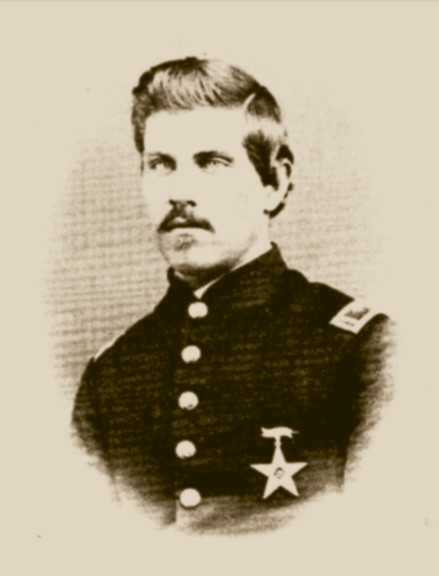
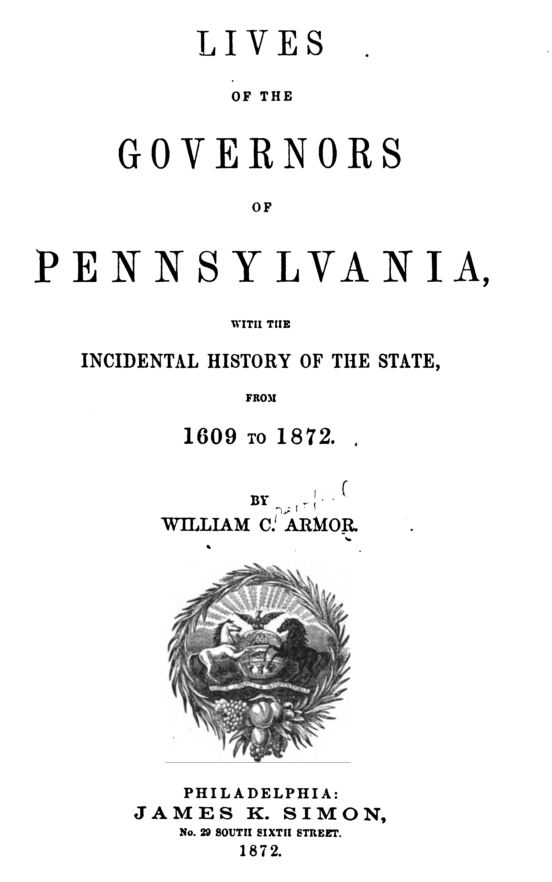
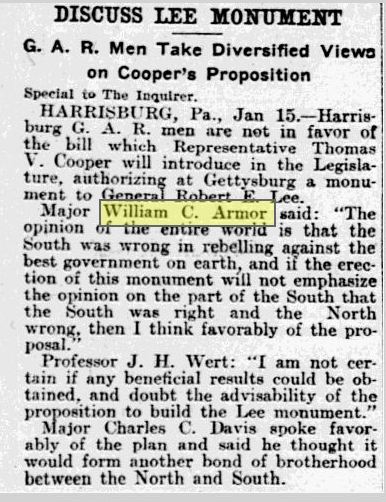
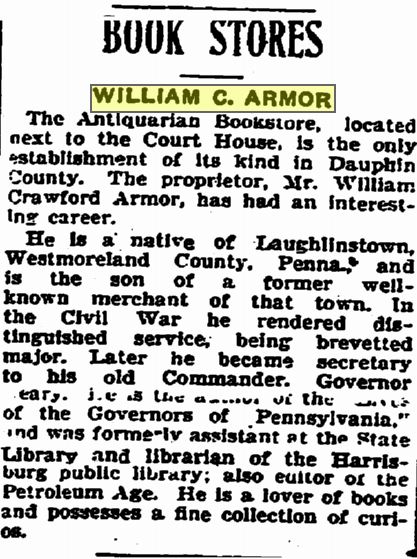
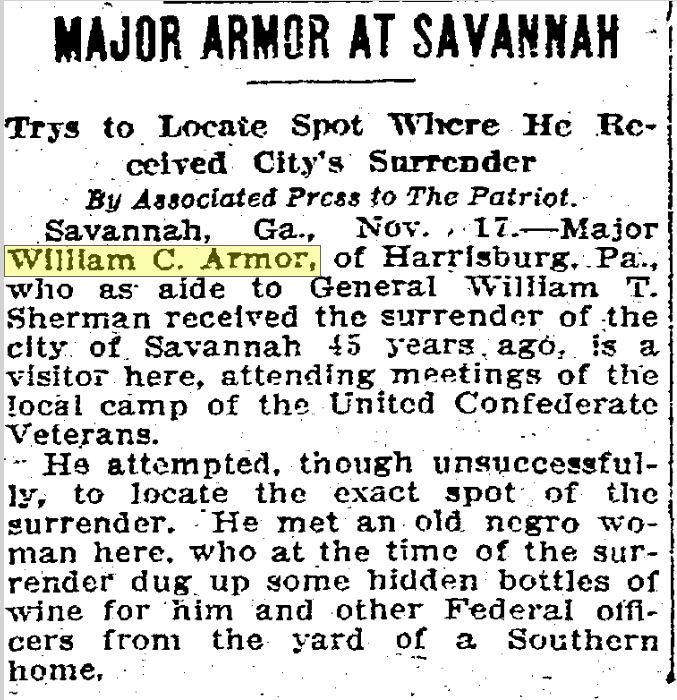
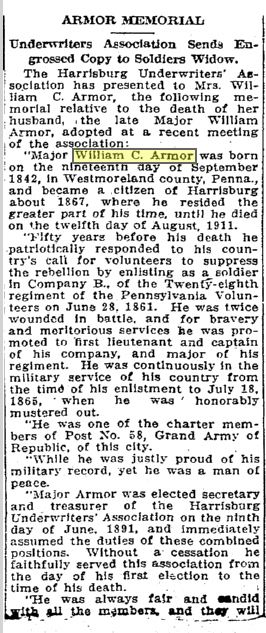
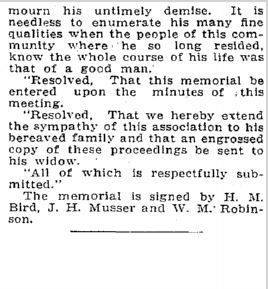


Comments